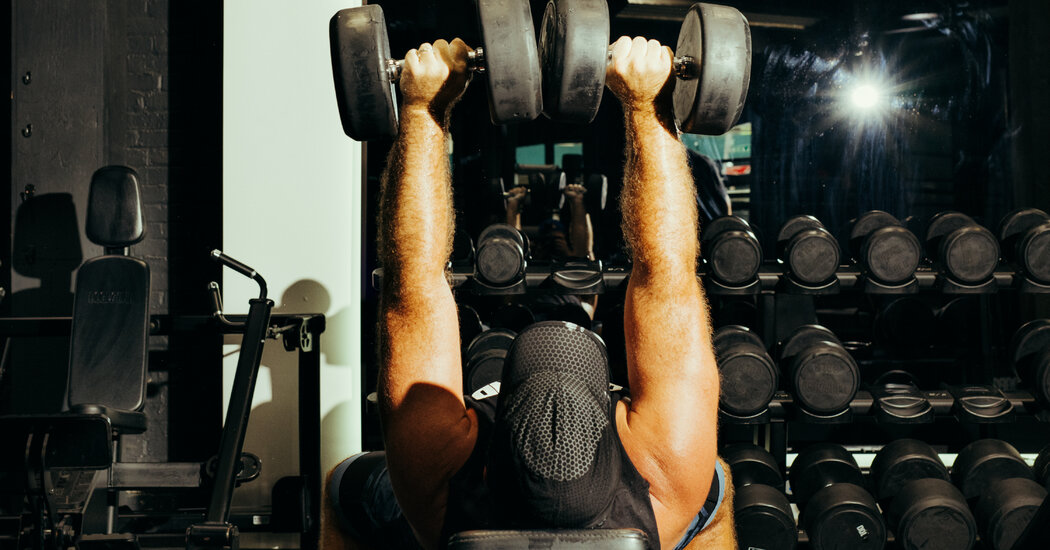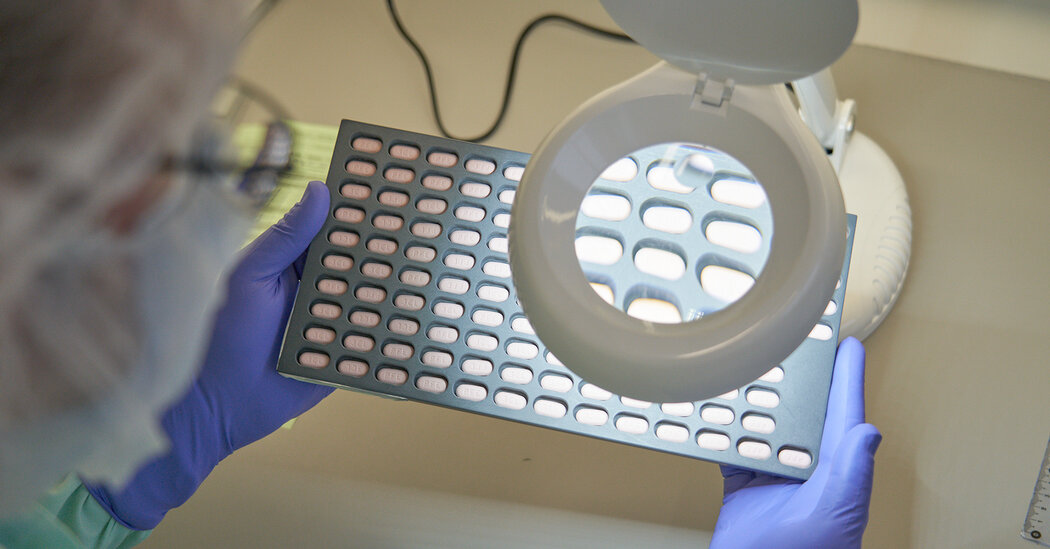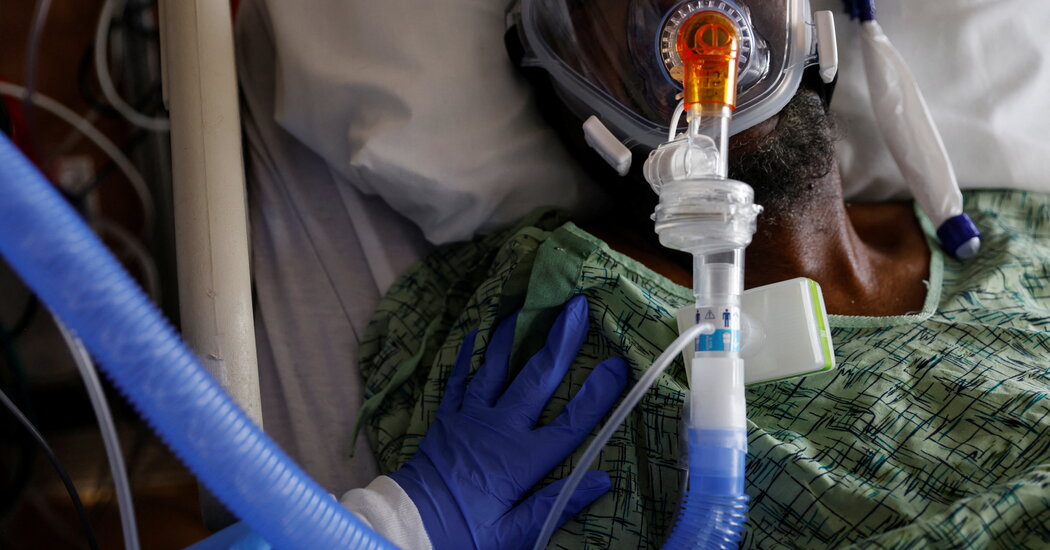Covid-19 treatments are widely available to at-risk New Yorkers, but many who could benefit from them may not even be aware they exist.One such treatment, an antiviral medication called Paxlovid, is very effective, said Dr. Ted Long, the head of New York City’s Test and Trace Corps, a city program that provides free testing and support to New Yorkers with Covid-19.“For every 20 New Yorkers that we treat with Paxlovid, we prevent one New Yorker from getting so sick that they would have to be admitted to the hospital,” Dr. Long said.Coronavirus cases in New York City have increased 6 percent over the past two weeks, according to The New York Times’s tracker, driven largely by the highly contagious Omicron subvariant BA.2. Hospitalizations have crept up 23 percent over the same time period.Across the country, hundreds of thousands of Paxlovid pills have gone unused, and the White House announced plans this week to expand access.The city’s health department did not say how many pills had been distributed in New York, though Dr. Ashwin Vasan, the health commissioner, said that uptake had been “significant.” This city has worked to get the word out through newspaper ads and public service announcements.“We’re in a new phase of the pandemic response, where we’ve got a range of tools at our disposal,” said Dr. Vasan.But some experts believe far too few people know about the treatments.“I’m not really sure that the average person who needs Paxlovid — by that I mean older people, people with comorbidities or otherwise medically vulnerable, unvaccinated people — know this critical information,” said Dr. Denis Nash, a professor of epidemiology at the City University of New York.Paxlovid, a Pfizer drug that was authorized in late December, is one of several available treatments that have been proven effective against Covid-19. It is preferred by the federal government and New York City officials because of how effectively it reduced the risk of death and hospitalization from Covid-19 in high-risk, unvaccinated adults during trials.Here’s an overview of the various Covid-19 treatments and how to get them in New York City.Which Covid-19 treatments are available?Evusheld is for people who are allergic to vaccines or who are immunosuppressed.Ted S. Warren/Associated PressBoth oral antiviral treatments and monoclonal antibodies are available. Antiviral pills work by interrupting the cycle of viruses infecting cells and then taking over those cells to replicate in the body, said Dr. Vasan. Monoclonal antibodies work by sweeping up the proteins that viruses produce, which in turn helps boost a person’s immune system.Two oral antiviral pills are available for Covid-19 in New York City: Paxlovid and molnupiravir.Paxlovid is prescribed as three pills taken twice a day for five days, while molnupiravir — authorized for use in December — is prescribed as four pills taken twice a day for five days.Both pills are available through an online pharmacy, Alto, and at a select number of pharmacies across the city. You can find a list of those nearby on a federal website.Most New Yorkers seeking antiviral treatments should expect to receive Paxlovid, given its efficacy, said Dr. Vasan.There are also two antibody treatments that appeared to be effective against BA.2 in laboratory studies: Bebtelovimab, authorized for use in February and taken intravenously, and Evusheld, authorized for use in December, for people who are allergic to vaccines or are immunosuppressed.Who is eligible for the treatments?For most of the treatments, city officials give priority to people who have not only tested positive for the coronavirus, but who also have mild to moderate symptoms and are at increased risk of developing serious illness. (Evusheld is given to people before they test positive.)You are considered at high risk of developing serious illness from Covid-19 if you are age 65 or older, or if you have health risks such as diabetes, hypertension or heart disease. Immunosuppressed people are also considered to be at high risk. The federal government has urged providers to prioritize the treatments for people who are unvaccinated, or aren’t yet fully vaccinated.You have to be older than 12 and weigh more than 40 kilograms, or around 88 pounds, to receive Paxlovid, bebtelovimab, and Evusheld. But you have to be at least 18 to take molnupiravir.People with severe kidney or liver disease may not be eligible for Paxlovid, and molnupiravir cannot be used during pregnancy. Pregnant or breastfeeding women should talk to their health care providers before taking Paxlovid, according to the F.D.A. fact sheet for the treatment.It is important for patients to talk with their providers about the medications they are taking, as they could negatively interact with the treatments, said Dr. Andrew Wallach, the ambulatory care chief medical officer at New York City Health and Hospitals.How do I get them?After you test positive, you should inform your doctor or call the city’s Covid hotline, 212-COVID19 (212-268-4319) and press 9 to be connected to one of the city’s doctors to determine your eligibility. You can also visit Virtual Express Care to schedule a phone or video visit or fill out the city’s screening tool too.After a doctor decides which treatment is right for you, it will be sent to a nearby pharmacy or to your home. The city’s partnership with Alto Pharmacy makes same-day home delivery possible.The Biden administration also recently unveiled a “test to treat” initiative, which makes it possible to get tested for the coronavirus at certain pharmacies, and if you test positive, receive free antiviral pills on the spot. You can find locations on the federal website.Do I have to pay?They are currently free for all New Yorkers, Dr. Vasan said.Are the treatments effective?The oral treatments have been proven to reduce hospitalization and death from Covid-19 if taken soon after the onset of symptoms.Paxlovid reduced the risk of hospitalization and death in high-risk, unvaccinated people by 88 percent when taken within five days of the onset of symptoms in a Pfizer trial published in December, before the Omicron wave.Molnupiravir reduced the risk of hospitalization and death in high-risk, unvaccinated people by 30 percent when taken within five days of the onset of symptoms, according to an analysis from Merck that was published in November.Bebtelovimab, which must be administered within seven days of symptoms starting, has not been tested in a study that can show whether it can stave off severe disease, and the Food and Drug Administration said it should not be a preferred treatment.Evusheld, which can be administered as often as every six months, was found to be strongly effective at preventing Covid in a clinical trial.Are there any side effects?The treatments have shown to be effective at reducing hospitalization and death from Covid-19.Eli Lilly and Company, via Associated PressPaxlovid is “well-tolerated,” said Dr. Wallach. Side effects that have been seen in small numbers in clinical trials include diarrhea, hypertension and soreness.Because bebtelovimab is given intravenously, some people may experience a rash at the injection site.How many New Yorkers have received these treatments?It’s hard to say. The health department was unable to provide data, in part because it didn’t “have visibility into the entire universe of pharmacies” that distribute many of the treatments, said Patrick Gallahue, a spokesman.There is an immunization registry that tracks vaccinations, but there isn’t a registry for prescription medication, said Dr. Nash.“It’s a problem that they don’t have their finger on the pulse of this, because it is the main thing that is going to help us contain these surges, hospitalizations and deaths,” he said. “That plus vaccines and boosters.”Dr. Nash worried that the inequities seen during each phase of the pandemic, including with the rollout of testing and vaccines, would play out again with these treatments.“If you don’t anticipate that the underlying inequities in access to health care are going to be magnified, if you don’t plan for it, then you’ve done a poor job at your job of taking care of the most vulnerable people in the city,” said Dr. Nash.How has the rollout gone so far?New Yorkers can expect to receive Paxlovid, but there are certain scenarios where a person will receive one of the other treatments, such as molnupiravir, instead.Amr Abdallah Dalsh/ReutersThe treatments are now available via Alto Pharmacy and community health centers. The health department is working on expanding access to brick-and-mortar pharmacies throughout the city, too. Ultimately, state officials decide how to allocate treatments to pharmacies.Colombo’s Pharmacy in Queens is one of the places that now offers Paxlovid and molnupiravir.It received its first batch, 20 doses of each medication, earlier this month. Dr. David Kandov, the pharmacist, said only about five people had asked for the treatments so far.Dr. Kandov expressed frustration about how long it took to receive the first batch, saying the network to which he belongs had been trying unsuccessfully to get access to the medications since December, when they were first authorized.He blamed the health department. “They effectively cut us out of it, and cut out the access in the communities,” Dr. Kandov said. “Because at the end of the day, as much as things are available virtually, mail order and those types of things, that’s not anywhere near the same as patients having it right there in their community.”“The city is offering a delivery model that ensures rapid access to any New York address, which started at a time when supplies were insufficient to stock brick and mortar pharmacies throughout the City,” said Mr. Gallahue. “As supplies have improved, more pharmacies have been onboarded.”
Read more →



